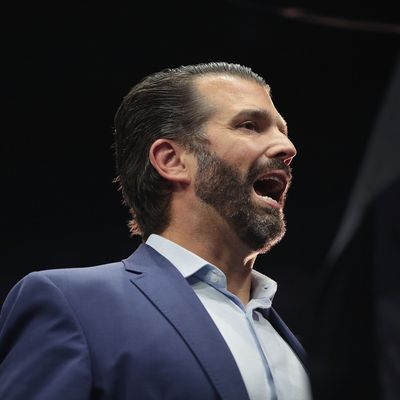
In special counsel Robert Mueller’s redacted report, we learned that Donald Trump Jr. was not prosecuted for campaign-finance violations related to the infamous summer 2016 Trump Tower meeting, in part because it could not be proven that he “willfully” violated the law. Rick Hasen, a professor of law and political science at the University of California, Irvine, as well as an expert on campaign-finance regulation, believes this was a mistake. Hasen spoke with Intelligencer and explained why.
You believe that Mueller let Donald Trump Jr. off too easily for potential campaign-finance violations. Why?
This goes back to the June 2016 Trump Tower meeting between officials of the Trump campaign, including Donald Trump Jr. and Paul Manafort, and people who were represented as connected to the Russian government. The Russians were supposedly offering dirt on Hillary Clinton, and Donald Trump Jr. was very excited. That’s where he gave his famous, “If it is what you say it is, I love it,” quote. So the question was whether or not this was an illegal foreign in-kind contribution. This has been one of the key legal questions hanging over Donald Trump Jr.’s conduct.
It was surprising to see that not only did Mueller not attempt to indict Donald Trump Jr. for this conduct, but he didn’t even call him before the grand jury. This is especially surprising given that one of the reasons that Mueller gives for not prosecuting Donald Trump Jr. is lack of evidence of willfulness, the kind of mental state that you need in order for there to be criminal campaign-finance violation. And of course bringing someone under oath before a grand jury is a way to get that kind of information.
So why not bring Trump Jr. before the grand jury?
It’s inexplicable to me why, if one of his problems is lack of evidence, he’s not seeking to get that evidence using the powers that he has. I think the answer must be that having called Donald Trump Jr. to the grand jury would have provoked Trump, and probably Mueller did not want to do that.
So either fear or deference?
It certainly would have drawn Trump’s ire. Whether he was afraid or didn’t want to rock the boat, or just wanted to complete his investigation, I don’t know what it is.
If Mueller had gone after Trump Jr., what kind of trouble would he be in?
To the extent that he was found to have violated campaign-finance laws by soliciting something that was worth at least $25,000, it could have been a felony, which potentially could involve jail time. We have had people go to jail for felonious campaign-finance violations.
But [Mueller] found some legal problems as well. I think his legal analysis was also questionable. It opens up the door to future problems in future elections.
What kind of further problems could arise?
Among the other reasons that Mueller gives for not going after Trump Jr. for the campaign-finance violations is the possibility that there might be a First Amendment problem with this, that there might be some First Amendment defense that Trump Jr. could have raised. I’ve written about why this is a bogus argument and why preserving the national security of the United States is a very strong reason to say that campaign officials should not be able to meet with foreign governments to obtain information on political opponents.
But all that Mueller did was flag the First Amendment concern. He doesn’t analyze it, leaves it open. Which I think could suggest to some campaigns that they would have a constitutional defense if they’re tried to do something like this in the future.
This interview has been edited for clarity.





























